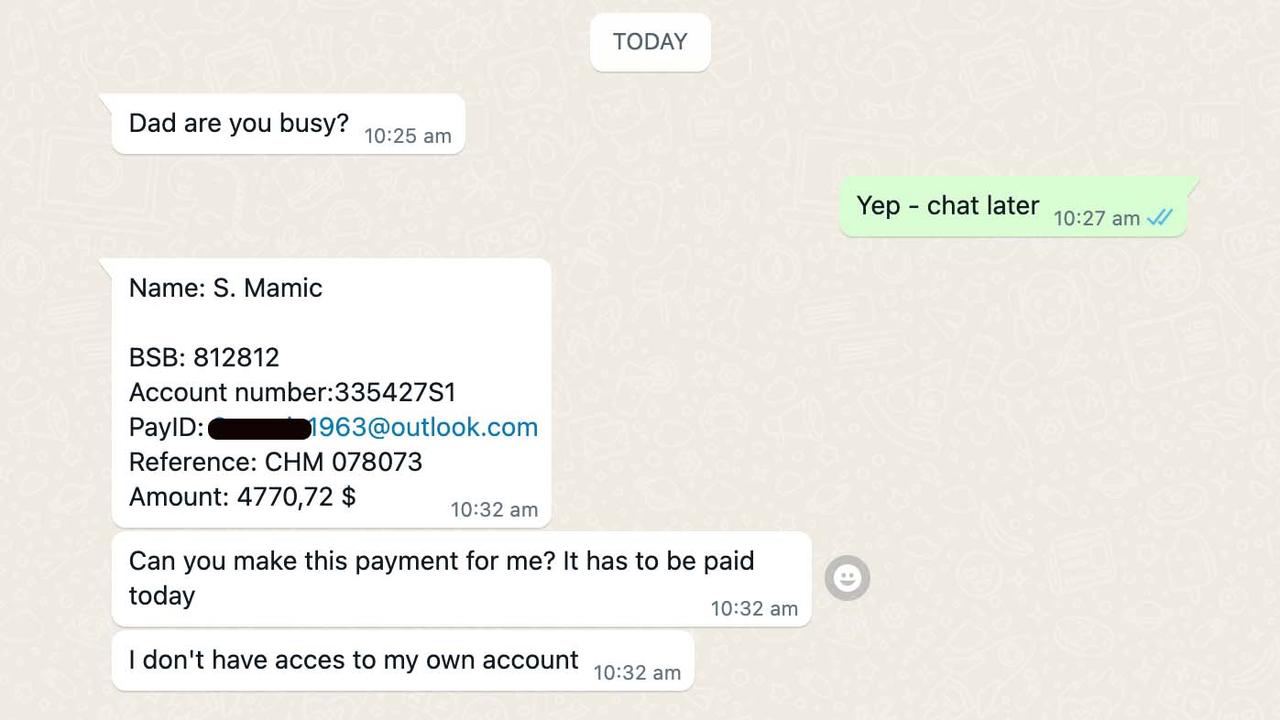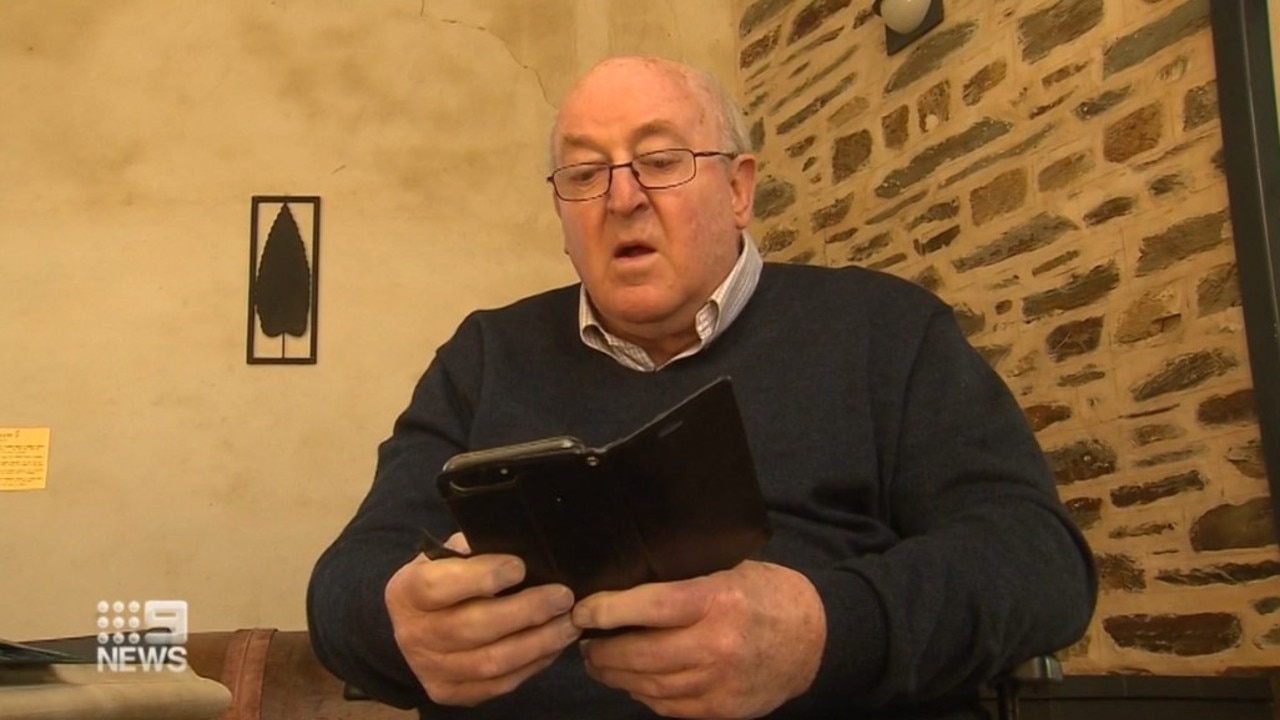Clue that exposed $5000 WhatsApp ‘mum and dad’ scam
Scammers are using a cruel new tactic to extort cash out of unsuspecting Aussies, but one dad who was targeted on WhatsApp knew something was wrong immediately.
A scammer has targeted an Australian immunologist claiming to be his son, but there was a telling clue the messages were in fact written by someone else.
The scam known as the “mum and dad” scam usually involves a scammer messaging a parent on WhatsApp claiming to be their child and asking for money.
Dr Alan Baxter shared the WhatsApp messages he received from a scammer pretending to be his son this month on Twitter.
The first message from the scammer read: “Hi dad this is my temp number I’m using an old device until my phone is repaired.”
The scammer went on to say that he dropped his phone and could no longer use his banking app, and therefore needed $4770.72 to be transferred to an ANZ account to make a payment.
Interesting case of attempted fraud on which @ANZ_AU refused to act. Got a text message from an unknown number, posing a my son in need of help and asking me to send money to an ANZ bank account. /2 pic.twitter.com/HVRePfHMWu
— Alan Baxter â™› (@AlanBixter) June 18, 2022
Dr Baxter told a fellow Twitter user he knew it was not his son due to the way the messages were written – his real son was an English teacher.
Dr Baxter shared his difficulty in trying to report the scam to ANZ, claiming a customer service worker for the bank hung up on him.
After sharing his experience on social media, ANZ replied saying they had forwarded the screenshot to their cyber security team.
Stream more tech news live & on demand with Flash. 25+ news channels in 1 place. New to Flash? Try 1 month free. Offer ends 31 October, 2022 >

A week later, Dr Baxter shared a screenshot of a new message from his “son”.
This time the scammer asked for the same amount of money to be transferred to a different bank account.
Last month, the Australian Competition and Consumer Commission’s Scamwatch warned of the “mum and dad” scam on Twitter.
“Scammers may pose as family and friends to gain instant trust,” it said. “If you get an unexpected message from someone claiming they have a new number or new bank account, call them directly on their usual number to confirm.”
Scammers may pose as family and friends to gain instant trust. If you get an unexpected message from someone claiming they have a new number or new bank account, call them directly on their usual number to confirm. pic.twitter.com/Wr2rz4vJ8x
— Scamwatch_gov_au (@Scamwatch_gov) May 24, 2022
This year, Scamwatch has received at least 325 reports related to “mum and dad” scams, with Australians losing more than $710,000.
It is expected losses may be even higher, as research shows that only around 13 per cent of people report their losses to Scamwatch.
Earlier this month an Adelaide grandfather told Nine News he lost $42,000 after falling victim to the “mum and dad” scam.
The scammer pretended to be Nigel Gammon’s son, who recently moved overseas, and asked for a picture of his credit card.
“I’m very upset about the whole incident, I think my son particularly feels guilty,” he said.
“It was one o’clock in the morning over there and I just didn’t want to ring him up, which I should have.”

A mum in England told BBC she lost more than $28,000 (£16,000) to a scammer she thought was her daughter.
“I received a text message from what I presumed was my daughter, asking me to delete the old phone number as she’d been given a new number,” Paula Boughton said.
“It went on after a couple of lines of text to ask me if I would make a transaction for her, which I agreed to, if she sent me the sort code, the payee’s details, and the account number.”
How to avoid being scammed
Queensland Police Detective Superintendent Mike Newman said he knew of people that had fallen for the “mum and dad” scam and Australians needed to be aware of what was happening.
“They’re going to talk in generalities. They’re going to say ‘hi mum’, ‘hi dad’. They’re not going to use their names,” he explained on Today last month.
“If the parents ask ‘who am I talking to?’, they’re going to say ‘it’s your oldest child’. They’ll be very obtuse about who they actually are.”
Supt Newman suggested parents have a codeword with their children to confirm their identity.
“Even if you ask to talk to them, sometimes they’ll pretend the phone doesn’t work or a video call. They’ll come up with any excuse as to why not to talk to you,” he said.
“The more excuses you get the more likely it is to be a scammer.”
WhatsApp policy manager Kathryn Harnett has also given advice on how to avoid the scam. “WhatsApp protects our users’ personal messages with end-to-end encryption, but we want to remind people that we all have a role to play in keeping our accounts safe by remaining vigilant to the threat of scammers,” she told media.
“We advise all users never to share their six-digit PIN code with others, not even friends or family, and recommend that all users set up two-step verification for added security.
“And if you receive a suspicious message (even if you think you know who it’s from), calling or requesting a voice note is the fastest and simplest way to check someone is who they say they are. A friend in need is a friend worth calling.”





